ALLATRA Representatives at the International Day of Conscience with world leaders at the UN Headquarters in Vienna
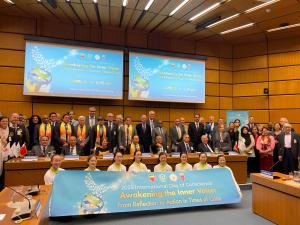
ALLATRA Movement Representatives at the International Day of Conscience with world leaders at the UN Headquarters in Vienna
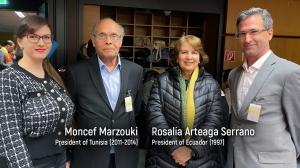
Rosalía Arteaga Serrano, President of Ecuador (1997) Moncef Marzouki, President of Tunisia (2011-2014) with ALLATRA volunteers
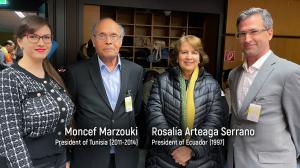
Rosalía Arteaga Serrano, President of Ecuador (1997), Moncef Marzouki, President of Tunisia (2011-2014) with ALLATRA volunteers
The International Day of Conscience, established by a United Nations General Assembly resolution in 2019, serves as a reminder of the importance of conscience as a moral compass in decision-making. Amidst global challenges — climate-related, social, and political — the event emphasized the need for inner integrity, responsible choices, and a culture of peace.
Key topics of the forum included:
• Promoting peace through personal responsibility and awakening of conscience
• The importance of ethical decision-making in politics and international relations
• The need to strengthen solidarity and dialogue among nations
• The role of education and culture in shaping moral values
ALLATRA participants engaged in conversations with guests and speakers, discussing global challenges — in particular, the intensifying climate changes and increasing natural disasters. They highlighted the importance of informing society about the real scale of the climate crisis and the need for international cooperation to address it.
Distinguished speakers included:
• Dr. Hong Tao-Tze, President of the Federation of World Peace and Love (FOWPAL)
• Rosalía Arteaga Serrano, President of Ecuador (1997)
• Moncef Marzouki, President of Tunisia (2011–2014)
• Filip Vujanović, President of Montenegro (2006–2018)
• Anthony Thomas Aquinas Carmona, President of Trinidad and Tobago (2013–2018)
• Vinzenz von Holle, President of the Dignity Foundation
• Dr. Akkan Suver, President of the Marmara Group Foundation
The event served as a powerful example of how inner values such as conscience, kindness, and responsibility can become the foundation for international cooperation and peace.
About the ALLATRA International Public Movement
ALLATRA International Public Movement is an independent volunteer movement conducting large-scale research in the fields of geodynamics, climate, and environmental changes. The Movement is known for its interdisciplinary approach to studying natural disasters and its active stance in promoting international scientific cooperation. Moreover, ALLATRA focuses on preserving and protecting the rights and freedoms of people worldwide.
Valerie Smith
ALLATRA
valerie@allatra.org
Legal Disclaimer:
EIN Presswire provides this news content "as is" without warranty of any kind. We do not accept any responsibility or liability for the accuracy, content, images, videos, licenses, completeness, legality, or reliability of the information contained in this article. If you have any complaints or copyright issues related to this article, kindly contact the author above.
Wytrwal Industries Celebrates 250 years of the U.S. Army
WHAT by Anthony Prebor Expands the Acclaimed ?: QUESTION Mystery Series
DRML Miner Expands Cloud Mining Services with Sustainable Infrastructure and Flexible Contracts
Kalendarium
Więcej ważnych informacji
 Jedynka Newserii
Jedynka Newserii

 Jedynka Newserii
Jedynka Newserii

Prawo

Trwają dyskusje nad kształtem unijnego budżetu na lata 2028–2034. Mogą być rozbieżności w kwestii Funduszu Spójności czy dopłat dla rolników
Trwają prace nad wieloletnimi unijnymi ramami finansowymi (WRF), które określą priorytety wydatków UE na lata 2028–2034. W maju Parlament Europejski przegłosował rezolucję w sprawie swojego stanowiska w tej sprawie. Postulaty europarlamentarzystów mają zostać uwzględnione we wniosku Komisji Europejskiej w sprawie WRF, który zostanie opublikowany w lipcu 2025 roku. Wciąż jednak nie ma zgody miedzy państwami członkowskimi, m.in. w zakresie Funduszu Spójności czy budżetu na rolnictwo.
Konsument
35 proc. gospodarstw domowych nie stać na zakup mieszkania nawet na kredyt. Pomóc może wsparcie budownictwa społecznego i uwolnienie gruntów pod zabudowę

W Polsce co roku oddaje się do użytku ok. 200 tys. mieszkań, co oznacza, że w ciągu dekady teoretycznie potrzeby mieszkaniowe społeczeństwa mogłyby zostać zaspokojone. Jednak większość lokali budują deweloperzy na sprzedaż, a 35 proc. gospodarstw domowych nie stać na zakup nawet za pomocą kredytu. Jednocześnie ta grupa zarabia za dużo, by korzystać z mieszkania socjalnego i komunalnego. Zdaniem prof. Bartłomieja Marony z UEK zmniejszeniu skali problemu zaradzić może wyłącznie większa skala budownictwa społecznego zamiast wspierania kolejnymi programami zaciągania kredytów.
Problemy społeczne
Hejt w sieci dotyka coraz więcej dzieci w wieku szkolnym. Rzadko mówią o tym dorosłym

Coraz większa grupa dzieci zaczyna korzystać z internetu już w wieku siedmiu–ośmiu lat – wynika z raportu NASK „Nastolatki 3.0”. Wtedy też stykają się po raz pierwszy z hejtem, którego jest coraz więcej w mediach społecznościowych. Według raportu NASK ponad 2/3 młodych internautów uważa, że mowa nienawiści jest największym problemem w sieci. Co więcej, dzieci rzadko mówią o takich incydentach dorosłym, dlatego tym istotniejsze są narzędzia technologiczne służące ochronie najmłodszych.
Partner serwisu
Szkolenia

Akademia Newserii
Akademia Newserii to projekt, w ramach którego najlepsi polscy dziennikarze biznesowi, giełdowi oraz lifestylowi, a także szkoleniowcy z wieloletnim doświadczeniem dzielą się swoją wiedzą nt. pracy z mediami.
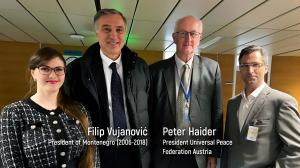
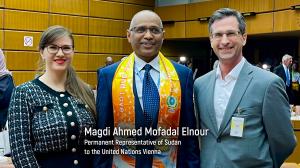








.gif)

 |
| |
| |
|